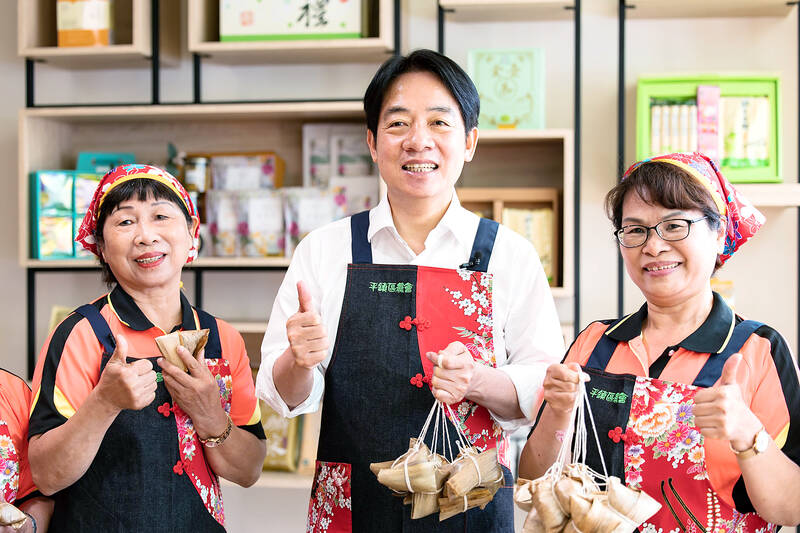Democratic Progressive Party (DPP) members yesterday defended a party plan to subsidize tuition fees after former Taipei mayor Ko Wen-je (柯文哲) said the proposal was to curry favor with young voters.
DPP members said that Ko — who is the Taiwan People’s Party’s presidential candidate — has a “snobbish” and “callous” attitude toward underprivileged students, after Vice President William Lai (賴清德) on Tuesday announced the plan to subsidize tuition fees at private universities.
Lai is the DPP’s presidential candidate.

Photo from William Lai’s Facebook page
“Ko came from a well-to-do family and never had to worry about tuition fees,” DPP Legislator Michelle Lin (林楚茵) said.
“He has no understanding of people from lower socioeconomic backgrounds,” Lin said. “He sees himself as among the elite, so he is snobbish and unsympathetic toward poor students.”
The policy aims to reduce the gap between fees at public and private institutes, Lin said.
“The current system is unfair to students from underprivileged families and Lai is making it equitable,” she said.
Surveys show that students at public universities tend to come from families with higher incomes who can afford to pay extra for private tutors and top cram schools, Lin said.
This allows them to get higher marks and enter state-funded institutions, she said.
“This means well-off students generally have an easier time being admitted to public universities, where they pay far less in tuition while benefiting from government resources,” Lin said.
“This is class inequality in higher education in Taiwan that stemmed from decades of authoritarian Chinese Nationalist Party (KMT) rule that channeled resources to society’s elites,” she said.
Lai’s proposal would close the gap by providing a NT$25,000 subsidy for eligible students at private institutions, she said.
Tuition at private institutions averages NT$110,000 per year, compared with NT$62,000 at public universities, she added.
Ko on Wednesday said that Lai was using state resources to “buy votes.”
The DPP pushes for reform, but has no results, he said.
“Lai says that he cares about the financial situation of students, but he has no plan to execute the policy,” Ko said. “It will create more debt for the next generation, saddling young people with more financial burdens.”
DPP Legislator Hung Sun-han (洪申翰) said that Ko “wants to preserve the unfair system in which students from lower socioeconomic backgrounds pay more, while rich people monopolize society’s resources.”
“Private education providers have far fewer resources and are usually considered to be lower-quality institutions,” Hung said. “Their graduates struggle to get high-paying jobs.”
“Many young people are lured by Ko’s boasts of his ‘fiscal restraint,’ but his intention is to consolidate benefits and advantages for the upper class and to widen the gap between rich and poor people,” Hung said.
Separately, the campaign office of New Taipei City Mayor Hou You-yi (侯友宜), the KMT’s presidential candidate, said that Lai’s proposal was “throwing money at problems” and would not boost competitiveness in Taiwan’s higher-education sector.
“The government should amend the law to protect the rights of faculty at private institutions and permit public universities to internationalize programs,” Hou’s office said. “It is important to maintain cross-strait peace and stability, so Taiwan should permit more students from China and other countries.”
“The plan is short-sighted,” it said. “Taiwan should plan for the long haul.”

The manufacture of the remaining 28 M1A2T Abrams tanks Taiwan purchased from the US has recently been completed, and they are expected to be delivered within the next one to two months, a source said yesterday. The Ministry of National Defense is arranging cargo ships to transport the tanks to Taiwan as soon as possible, said the source, who is familiar with the matter. The estimated arrival time ranges from late this month to early next month, the source said. The 28 Abrams tanks make up the third and final batch of a total of 108 tanks, valued at about NT$40.5 billion

Two Taiwanese prosecutors were questioned by Chinese security personnel at their hotel during a trip to China’s Henan Province this month, the Mainland Affairs Council (MAC) said yesterday. The officers had personal information on the prosecutors, including “when they were assigned to their posts, their work locations and job titles,” MAC Deputy Minister and spokesman Liang Wen-chieh (梁文傑) said. On top of asking about their agencies and positions, the officers also questioned the prosecutors about the Cross-Strait Joint Crime-Fighting and Judicial Mutual Assistance Agreement, a pact that serves as the framework for Taiwan-China cooperation on combating crime and providing judicial assistance, Liang

A group from the Taiwanese Designers in Australia association yesterday represented Taiwan at the Midsumma Pride March in Melbourne. The march, held in the St. Kilda suburb, is the city’s largest LGBTQIA+ parade and the flagship event of the annual Midsumma Festival. It attracted more than 45,000 spectators who supported the 400 groups and 10,000 marchers that participated this year, the association said. Taiwanese Designers said they organized a team to march for Taiwan this year, joining politicians, government agencies, professionals and community organizations in showing support for LGBTQIA+ people and diverse communities. As the first country in Asia to legalize same-sex

MOTIVES QUESTIONED The PLA considers Xi’s policies toward Taiwan to be driven by personal considerations rather than military assessment, the Epoch Times reports Chinese President Xi Jinping’s (習近平) latest purge of the Chinese People’s Liberation Army (PLA) leadership might have been prompted by the military’s opposition to plans of invading Taiwan, the Epoch Times said. The Chinese military opposes waging war against Taiwan by a large consensus, putting it at odds with Xi’s vision, the Falun Gong-affiliated daily said in a report on Thursday, citing anonymous sources with insight into the PLA’s inner workings. The opposition is not the opinion of a few generals, but a widely shared view among the PLA cadre, the Epoch Times cited them as saying. “Chinese forces know full well that